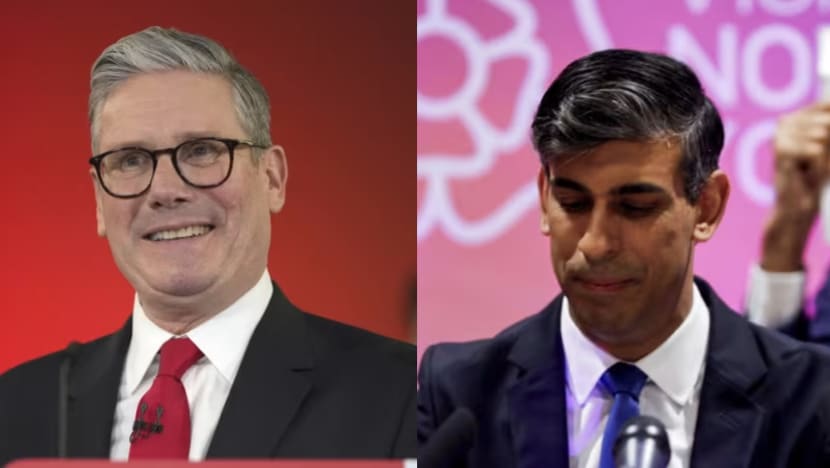Snap Insight: Conservatives’ record losses in UK election hold lessons for new Labour government
The UK’s new Labour government was elected on a modest and cautious campaign, leaving the Conservative party grappling with an identity crisis, says former UK policy adviser Rob Manwaring.


This audio is generated by an AI tool.
ADELAIDE, Australia: After 14 long years in opposition, the UK's Labour Party under the leadership of Keir Starmer will take office. This has been a long road out of the wilderness, but the landslide win for the Labour Party and the UK’s first-past-the post electoral system, however, obscures a few important trends and challenges.
For the Conservatives, this has shaped up to be their worst ever electoral result since their landslide losses in 1997. There is now a battle underway for the “soul” of the Conservative party, and much of this will be shaped by who will be left on the Conservative benches.
For some, such as former Tory MP Andrea Leadsom, the Conservatives lost because they “were not conservative enough”, pointing to the rise of Nigel Farage’s Reform UK party.
Some Conservatives point to incumbency as a factor. Renewing long-term governments is difficult, and even former Labour prime ministers Tony Blair and Gordon Brown struggled with this.
However, there are more significant reasons why the Conservatives received such an electoral hammering. Crucially, there are lessons for Labour too.
THE COST OF INCOMPETENCE
The Conservatives were punished for incompetence and a decline in standards of public office. Former prime minister Boris Johnson’s handling of the COVID-19 pandemic was dismal. In comparison to other European countries, the mortality rate in the UK was much higher.
Mr Johnson then presided over a series of scandals such as the “partygate” affair, where he hosted gatherings breaching COVID-19 rules that his government put in place.
Effective governance, once the Conservative party’s trademark, proved to be its undoing. Here, the short-lived prime ministership of Liz Truss is instructive. Her “mini-budget” of unfunded tax cuts, intended as electric shock therapy for the country’s economy, roiled markets and public confidence. Outgoing Prime Minister Rishi Sunak was never able to recover support in the polls from that point.
These crises, along with Brexit and rising inflation, have exposed divisions and instability within the Conservative party. Leadership churn has proven to be highly damaging to the centre-right party. The turnover of prime ministers, chancellors and home secretaries undermined the capacity to build up electoral momentum.
The election result reflects a broader ideological fragmentation, and in particular an identity crisis for UK right-wing politics. The Conservative party has become more factionalised since the country’s 2016 referendum to leave the European Union.
There is a socially conservative wing that wishes to use cultural issues to appeal to voters. Mr Sunak's last-ditch policy on introducing national service sought to capture this. There is a strong neoliberal wing that purses a low tax, low public spending agenda. There is a declining moderate wing that attempts a more pragmatic course between these differing traditions.
The battle for the soul of the party will centre on these stark differences.
A DISAFFECTED PUBLIC
A key takeaway from the 2024 election is the evisceration of public services in the UK. This is not so much the fault of recent Conservative leaders such as Liz Truss and Boris Johnson, but former chancellor Geroge Osbourne’s austerity agenda in the early 2010s.
This led to a slow bleeding of resources in Britain’s public services, manifesting as declining levels of legal aid, local governments such as Birmingham declaring bankruptcy, a tripling of National Health Service waiting lists, and record levels of homelessness.
This has left the British public in a disaffected state. Turnout at the election looks to be one of the lowest on record.
The electoral breakthrough of the populist radical right has also come to pass, with the Reform UK party taking advantage of disaffected voters. The vote share of the major parties looks to be in decline.
If Labour wishes to remain in office, then it will need to learn lessons from the Conservative loss.

COMMON CAUSE WITH OTHER CENTRE-LEFT LEADERS
Where does this leave the UK? It is now headed by a centrist government, elected on a modest and cautious campaign. Mr Starmer might well try and find common cause with other centre-left leaders in the US, Australia and Germany. A key part of his agenda will be driving a clean energy transformation and building a fresh wave of action to tackle climate change.
At this stage, the UK’s future engagement with the world is not fully clear. One of Labour’s first steps is to set out a trade policy, which will indicate priority areas for the new government. Given the dent in trading relations with the UK, the Labour government will actively try to strengthen financial ties with overseas partners.
While the Labour manifesto lacks detail, India and China are singled out for future cooperation. Labour will develop a new strategic partnership with India, including a potential free trade agreement. What might fly under the radar are sector specific trading agreements, especially in the digital space.
The new Labour government seeks to find a realignment with the European Union, but it is far from clear how it can do so. Rhetorically, Labour is pushing for “a reset” with the EU, but rules out any movement on the customs union, free movement and the single market. There is promise of a new security pact, but again, a lack of detail.
The feasibility of these promises remains open to question. After 14 years of waiting, Labour will have to quickly reacquaint itself with the complexities of international relations.
Rob Manwaring is Associate Professor in the College of Business, Government and Law at Flinders University, Australia. He worked for the UK's Commission for Racial Equality as a senior policy adviser.


















